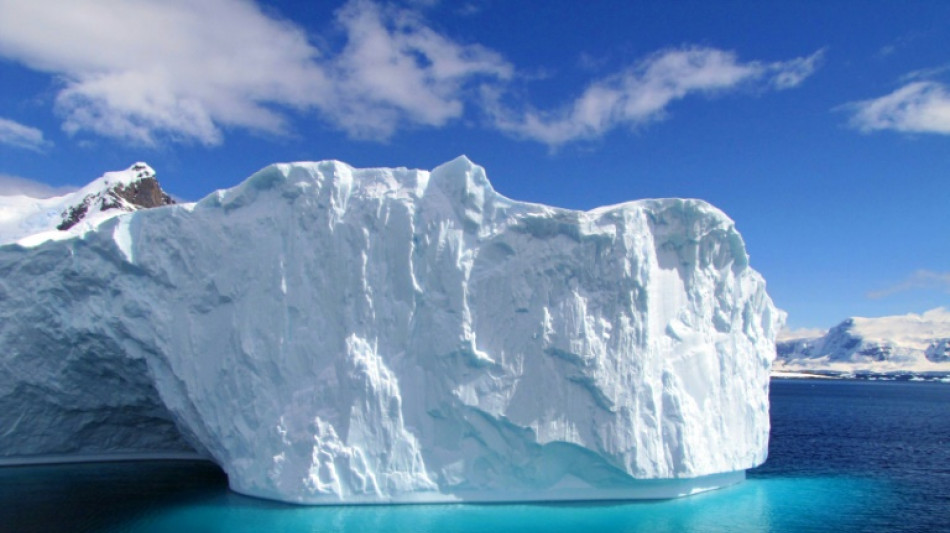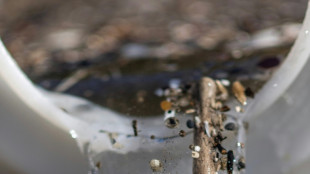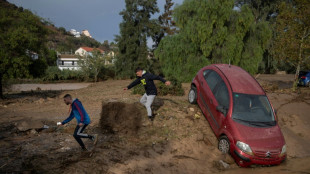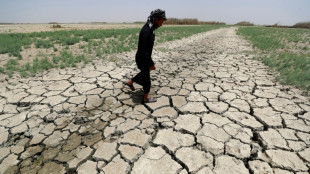
-
 Jurgen Klopp to target player welfare in Red Bull role
Jurgen Klopp to target player welfare in Red Bull role
-
Volkswagen sees 'painful' cost cuts ahead as profit plunges

-
 Spain races to save victims as floods kill 62
Spain races to save victims as floods kill 62
-
Tuberculosis cases hit record high: WHO

-
 Volcanoes 'hidden source' of CO2 in past climate change: study
Volcanoes 'hidden source' of CO2 in past climate change: study
-
Eurozone economy grows faster than expected

-
 Mediators to propose Gaza truce amid deadly Israeli strikes
Mediators to propose Gaza truce amid deadly Israeli strikes
-
China's Hisense first sponsor of new Club World Cup

-
 Georgia prosecutors probe alleged election 'falsification'
Georgia prosecutors probe alleged election 'falsification'
-
New Zealand's Ajaz 'emotional' on Mumbai return after perfect 10

-
 Trump, Harris in frantic campaign push as US election nears
Trump, Harris in frantic campaign push as US election nears
-
Worries for Japan economy after election shock

-
 Israel short on soldiers after year of war
Israel short on soldiers after year of war
-
Volkswagen profit plunges on high costs, Chinese slump

-
 De Zorzi out for 177 as S.Africa power to 413-5 against Bangladesh
De Zorzi out for 177 as S.Africa power to 413-5 against Bangladesh
-
'CEO of supercute': Hello Kitty turns 50

-
 Australia head coach McDonald handed new deal until 2027
Australia head coach McDonald handed new deal until 2027
-
Visual artist grabs 'decisive moment' to nurture Chad art scene

-
 Industrial slump leaves Germany on brink of recession
Industrial slump leaves Germany on brink of recession
-
'I'm terrified': French auteur Audiard hits Oscars trail for 'Emilia Perez'

-
 New Indonesia defence chief harks back to dictator's rule
New Indonesia defence chief harks back to dictator's rule
-
In Tennessee, the despair of gun control advocates

-
 US economy's solid growth unlikely to register at ballot box
US economy's solid growth unlikely to register at ballot box
-
'A treasure': Japan's Ohtani a hometown hero win or lose in World Series

-
 Botswana votes with ruling party seeking to extend six decades of power
Botswana votes with ruling party seeking to extend six decades of power
-
Bitcoin close to record as cautious markets eye US election

-
 Hometown hero Volpe lives dream with grand slam for Yankees
Hometown hero Volpe lives dream with grand slam for Yankees
-
Rested relief pitchers please Roberts even after Dodgers defeat

-
 UK's Labour govt prepares to deliver decisive first budget
UK's Labour govt prepares to deliver decisive first budget
-
Volpe's grand slam helps Yankees avoid World Series sweep

-
 Taiwan battens down for Super Typhoon Kong-rey
Taiwan battens down for Super Typhoon Kong-rey
-
MotoGP world title in sight as Martin, Bagnaia set for Sepang duel

-
 'New wave' as start-up sweeps up Thai ocean plastic
'New wave' as start-up sweeps up Thai ocean plastic
-
Botswana votes with ruling party aiming to extend six decades of power

-
 How harmful are microplastics to human health?
How harmful are microplastics to human health?
-
Are bioplastics really the wonder alternative to petro plastics?

-
 Rumble in the Jungle remembered after 50 years
Rumble in the Jungle remembered after 50 years
-
Trump risks backlash with anti-trans ads targeting Harris

-
 Alzheimer's patient 'relieved' at Quebec's assisted suicide policy shift
Alzheimer's patient 'relieved' at Quebec's assisted suicide policy shift
-
Who should get paid for nature's sequenced genes?

-
 Bodies found as torrential rains slam Spain
Bodies found as torrential rains slam Spain
-
Climate change driving 'record threats to health': report

-
 Harris warns of 'obsessed' Trump power grab at mass Washington rally
Harris warns of 'obsessed' Trump power grab at mass Washington rally
-
Southampton, Brentford scrape into League Cup quarter-finals

-
 PGA players council seeks smaller fields, fewer full tour spots
PGA players council seeks smaller fields, fewer full tour spots
-
Napoli extend lead at top of Serie A with win at AC Milan

-
 Jennifer Lopez to boost Harris at glitzy Las Vegas event
Jennifer Lopez to boost Harris at glitzy Las Vegas event
-
Global stocks mixed as markets await Big Tech results

-
 Three-person crew blasts off for China's Tiangong space station
Three-person crew blasts off for China's Tiangong space station
-
Google reports strong growth driven by AI, Cloud

| RBGPF | 100% | 62.35 | $ | |
| CMSC | -0.65% | 24.57 | $ | |
| SCS | -3.11% | 12.21 | $ | |
| NGG | -1.35% | 65.12 | $ | |
| BCC | -5.3% | 131.64 | $ | |
| GSK | 0.76% | 38.17 | $ | |
| AZN | -1.05% | 75.22 | $ | |
| BTI | -1.31% | 34.46 | $ | |
| RELX | -0.52% | 47.91 | $ | |
| RIO | 0.6% | 66.58 | $ | |
| RYCEF | 0.55% | 7.25 | $ | |
| BCE | -0.71% | 32.46 | $ | |
| JRI | -0.69% | 12.98 | $ | |
| CMSD | -0.16% | 24.84 | $ | |
| VOD | -2.8% | 9.28 | $ | |
| BP | -5.76% | 29.36 | $ |

Australia wants 'eyes on Antarctica' with funding boost
Australia on Tuesday announced plans to boost its presence and surveillance operations on Antarctica, unveiling a US$575 million package designed to match China's growing interest in the pole.
Prime Minister Scott Morrison said the ten-year funding plan would give Australia "eyes on Antarctica" -- by increasing the country's ability to survey and monitor the frozen tundra and surrounding waters using drones, helicopters and autonomous vehicles.
Australia has territorial claims on 42 percent of Antarctica, the largest of any nation, but has lacked the capability to reach far-flung corners of the continent.
There has been concern in Canberra that the void could be exploited by Beijing or Moscow, both of which are becoming more active on the continent.
Nearly half of Australia's new funding will be spent on capabilities to move around inland areas, map Antarctica's remote east from the air using drones and the purchase of four new medium lift helicopters.
There are also a handful of environmental projects in the announcement, including US$5 million for research into climate change's impact on Antarctic ice sheets and supporting Pacific nations in monitoring rising sea levels.
Morrison refused to be drawn on his specific concerns about China's growing interest in Antarctica beyond saying, "They don't share the same objectives as Australia does."
China has built two year-round stations on Antarctica and its spending on Antarctic programmes has steadily increased.
But Beijing's footprint is dwarfed by the United States, which maintains the largest presence in Antarctica with about 1,400 personnel staffing its three all-year stations in summers before the pandemic.
The influential Australian Strategic Policy Institute recently warned in a report that Antarctica has become a venue for "geopolitical competition" and recommended steps to uphold a ban on military and mining activities.
Evan Bloom, the report's author and a Polar expert at the Woodrow Wilson Center, noted that while China and Russia are "heedless at times of calls to compromise" it was important for the US and Australia to "carefully manage relations with strategic competitors."
He said when it comes to the management of Antarctica, co-operation remained vital.
"Excluding China from science cooperation has the danger of giving credence to those within the Chinese Government who wish to argue that the ATS [Antarctic Treaty System] doesn't benefit it and doesn't deserve a long-term commitment," Bloom said.
T.Batista--PC
